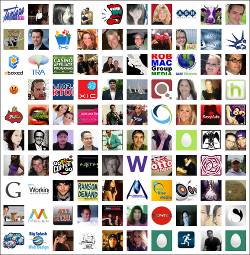
Many companies want a bigger, stronger, and more productive online audience. So, it makes sense to look toward the Internet when they need help, right? It seems a common answer is “no”.
It may seem strange that so many companies need and want help to market themselves better online, but yet, turn to an offline connection to help them do it. A lot of companies who are in the market to hire a consultant for their online marketing are seeking a warm handshake, meetings in-person, and looks in the eye. They are understandably cautious about this sort of service. It makes sense, but yet it doesn’t.
The topic came up in a conversation with a friend earlier today. He is excited about partnering with a company that provides social media consulting services. He gave me the web address, and said he had spoken to them about how I am able to help them with their online presence. It sounds crazy, right? The social media consulting company needs social media help.
What shook me was that he said they have more business than they can presently handle, but their online presence is miserable. How miserable? They have sent under 100 tweets on Twitter, their latest video on YouTube had under 50 views and was uploaded over a year ago, and more than I can express, it was simply atrocious! Even the big rage online marketers have been touting lately … Klout (the online influence measurement company) did not have a profile for them.
Oh, but they’re selling like mad, so it really made me question the logic. How can somebody be successful at something without a demonstrated ability to do it? Even if they can do it, how can they be taken seriously if they don’t practice what they preach? This may sound just a bit jealous, but for many years, I thought I actually had to prove that I know my business. I have been wrong, and I see similar instances all the time. I think they must just smell really good, but I’ll explain that.
This is one side of the hypocrisy, but I’m not to the good part yet … the buyer’s hypocrisy.
Smelling is Not Due Diligence … Research Is!
I certainly recognize and respect the human aspects of doing business. It feels good to look somebody in the eye, and a lot of people believe they can tell a person’s integrity from their body language. Of course, it helps if you have training in the field of psychology, or spent some time as an F.B.I. agent. Let me tell you, though, there are plenty of people who will fake anything for money … I’ve met some of them.
I’d like to point out some things I’ve learned from over a decade and a half in a line of work where I have met less than one tenth of one percent of my customers in person. It really doesn’t hold the benefit to the client that most people imagine and hope for. It actually turns out that it is a whole lot more beneficial to the seller than the buyer.
Here’s where the buyer’s perception gets screwy. Think about this for a moment: Doesn’t this seem hypocritical to imagine a company that wants to sell more online, but cannot make their own fact-based judgments online? Companies often seek the faith of their customers online, but they, themselves, do not have the faith they ask from others. They have the tools at their disposal for making rational and logical decisions, but prefer to use a less effective and less objective tool set, in their meeting room. What’s worse, it often hurts the buyer, by opening them up to whatever brand of fairy dust is being pumped into the room.
Meeting in person will not tell you if somebody knows the Internet as accurately as their demonstrated abilities online will show. In fact, it will show a whole lot less than spending some time with our old friend Google. The only thing shaking hands and talking in a meeting room will reliably prove is whether they know more about the Internet than you do. It will not prove whether they know more than your competitor, and it will not prove whether they know how to produce an appropriately targeted audience, or even a fraction of what they say. Spending time researching them online is what proves those things.
Sitting across a table will not tell you if they are a crook. Ironically, you have to look online for that! The only thing it will really tell you beyond what you can learn online, over a telephone communication, or a Skype video conference is how they smell.
I’ll just tell you right now … I smell like cigarette smoke and coffee, but I can bend a crooked online marketer over my knee and whip them like the crybaby sissy bed-wetter they are.
Rational Thinking Eludes Confused People
It may just be a little too rational for companies to seek social media services where they can actually shop and compare, and can see who has demonstrated abilities or does not. Companies are made up of people, and people are not rational and logical about things they don’t fully understand, such as social media marketing, search engine optimization, and other areas of online marketing.
I’m too deep in the online side of this equation to be objective, but I categorize this as an absurdity. It seems as hypocritical as it gets for a company to ask customers for faith in something they fear too much to embrace. My best guess is that they are just waiting for a good smelling pitch man.
What do you think? Please share your comments on the topic.
Oh, but wait … here is some bonus material.
Where Can You Find Good Marketing People, and How Will You Know?
Just when I thought I was done writing about this topic, I realized that it leaves a question open about a better way to seek an online marketing professional. I do not have all the perfect answers, because that question has a lot of possible conclusions. I’ll give you a couple thoughts that may help you.
First and foremost, consider how you arrived here. If somebody sent you here, ask them what else they know. Sure, there may be a few dummies reading my blog, but I would suggest that many of them I have encountered are pretty bright, and have a strong interest in the areas of social media marketing and/or SEO. Look at the comments here on this article and check those people out. If they have been reading for a while, they probably have some pretty good ideas about marketing online.
Of course, if you arrived because I brought you here … call me … ask questions. I am for hire! Even if I cannot help you, I’ll try to suggest a good match and avoid a costly catastrophe. I am not a good fit for everybody, and I only take on one to three clients at any given time, but I sure know a lot of quality people in my line of work.
Your best fit will depend on your needs and expectations. If you want marketing excellence, it may require more digging, and the investment will be much higher.
If you are trying to keep within a small budget, or you have a tight time frame, be sure to understand how and why it will affect you return on investment. Discuss this with any potential marketing professional you are considering. Be sure they have an acceptable answer for you.
I must suggest, just as I have previously explained about search engine optimization, many of the best marketing people are not looking for you. It is also true, in my case, and I believe many other do not enjoy the sales process of their work as well as they enjoy the work they do. So, it may be best to not expect them to do a lot of schmoozing.
In any instance, the most important factors regarding their experience and knowledge will be found online. If they are good in their line of work, they will be very easy to discover with a search for their name on Google. Look at what they are doing online. Check them out. See what others are saying about them. Read their blog … a lot! It will give you a much clearer view of their ideas and their methods.
Finding the right fit will be worth your effort. Due diligence takes patience, but it will save you a lot of money and hassles! On the other hand, a horrible mistake I see companies endure is believing that because a friend, acquaintance, or somebody in their area knows just a little about Twitter or Facebook, they are safer with that, than to risk the effort and do a little research. Maybe they really are the right one, or maybe they are not. If the way they smell is used as a primary measurement, the company gets what they deserve. It is often how companies end up with fakes like these “marketing experts”.
OK, so I’m asking again … What do you think?
Photo Credit:
NO MORE PROTESTS by hobvias sudoneighm via Flickr
Podcast: Play in new window | Download



